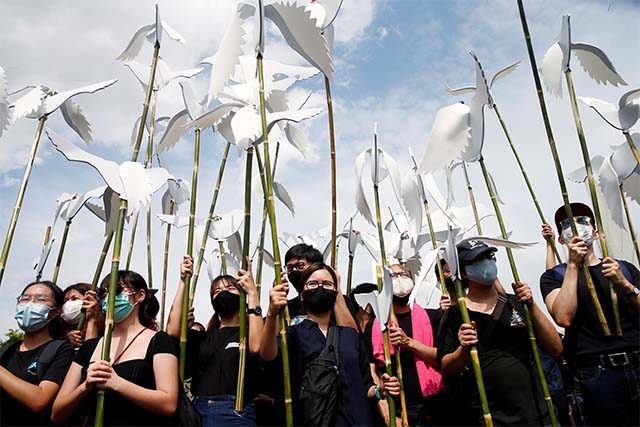
BANGKOK — More than 10,000 people joined the biggest protest in Thailand since a 2014 coup on Sunday to demand that the government step down and bring in a new constitution for fresh elections.
Some protesters are also pushing for reforms to the monarchy — until recently a taboo subject.
How did the protests start?
Anti-government protests first emerged late last year after courts banned Future Forward, the most vocal party opposing the government of former junta leader Prayuth Chan-ocha and one that drew strong support among Thai youths.
The protests went largely online while curbs were in place to stop the spread of the coronavirus, but re-emerged in mid-July. Since then, demonstrations organised by student groups have taken place almost daily.
There was strong student representation at the protest on Sunday, but there were also many older people among the crowds.
What are the protesters demanding?
The are three key demands: For Prayuth’s government to step down, for a new constitution to be drawn up and for an end to the harassment of opposition activists.
But some students have also presented 10 demands for reforms to the powerful monarchy of King Maha Vajiralongkorn.
These include curbs on his constitutional powers as well as his authority over the palace fortune and armed forces. They also want an end to the monarchy’s role in politics, but emphasize they are not seeking to abolish it.
Such public demands for change by any group are unprecedented in living memory.
What is driving the grievances?
Opponents of Prayuth accuse him of maintaining the power he first seized in a 2014 coup through an election last year that was held under rules that favored him. He disputes this.
Other factors have also emerged, including anger over accusations of government corruption and a feeling that the Thai elite acts with impunity. Meanwhile, poverty has been exacerbated by the collapse of the crucial tourist industry as a result of the coronavirus pandemic.
The disappearance of a Thai anti-government activist in Cambodia, the latest of nine to go missing in recent years, has fuelled disaffection.
Many young Thais also voice frustration with an establishment that emphasizes obedience to authorities and tradition, with the monarchy described by the constitution as “enthroned in a position of revered worship”.
How has the government responded?
The government has said that people are allowed to show dissent and Prayuth has said he seeks dialogue with the protesters.
But three student protest leaders have already been arrested and released on bail on charges over the earlier protests, and police say there are warrants for the arrest of a further 12.
Prayuth has said the king has requested him not to use the lese majeste laws that provide for up to 15 years in prison for anyone insulting the monarchy.
What opposition is there to the protesters?
There have been a handful of pro-monarchy demonstrations to counter the anti-government protests, but even the biggest has drawn no more than a few dozen people.
Those have included former members of the strongly royalist yellow shirts, who for more than a decade before the last coup had clashed with red shirt protesters loyal to former populist prime minister Thaksin Shinawatra.
Some former red shirts have meanwhile appeared at the anti-government protests.
This has stirred concerns in Thailand that there could be a return to the street violence of the past, although so far the protests have been peaceful.
What happens next?
Protesters have vowed to continue taking action until their demands are met.
The protests, and particularly the criticism of the monarchy, have put the government in a bind.
Political analysts have said that if it acts too harshly, it risks provoking a backlash that will further encourage support for the protests. If it does not take strong action, however, the protesters may be further emboldened to break longstanding taboos. —Reporting by Matthew Tostevin and Panu Wongcha-um; Writing by Matthew Tostevin; Editing by Catherine Evans









